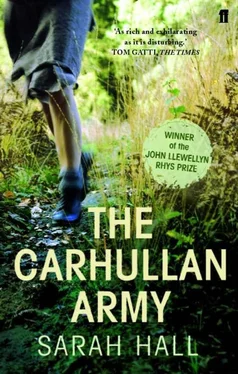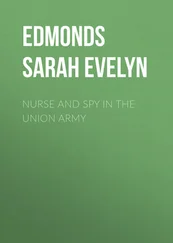Sarah Hall - The Carhullan Army
Здесь есть возможность читать онлайн «Sarah Hall - The Carhullan Army» весь текст электронной книги совершенно бесплатно (целиком полную версию без сокращений). В некоторых случаях можно слушать аудио, скачать через торрент в формате fb2 и присутствует краткое содержание. Год выпуска: 2008, Издательство: Faber and Faber, Жанр: Современная проза, на английском языке. Описание произведения, (предисловие) а так же отзывы посетителей доступны на портале библиотеки ЛибКат.
- Название:The Carhullan Army
- Автор:
- Издательство:Faber and Faber
- Жанр:
- Год:2008
- ISBN:нет данных
- Рейтинг книги:4 / 5. Голосов: 1
-
Избранное:Добавить в избранное
- Отзывы:
-
Ваша оценка:
- 80
- 1
- 2
- 3
- 4
- 5
The Carhullan Army: краткое содержание, описание и аннотация
Предлагаем к чтению аннотацию, описание, краткое содержание или предисловие (зависит от того, что написал сам автор книги «The Carhullan Army»). Если вы не нашли необходимую информацию о книге — напишите в комментариях, мы постараемся отыскать её.
The Carhullan Army — читать онлайн бесплатно полную книгу (весь текст) целиком
Ниже представлен текст книги, разбитый по страницам. Система сохранения места последней прочитанной страницы, позволяет с удобством читать онлайн бесплатно книгу «The Carhullan Army», без необходимости каждый раз заново искать на чём Вы остановились. Поставьте закладку, и сможете в любой момент перейти на страницу, на которой закончили чтение.
Интервал:
Закладка:
The buildings sat in total isolation, far from any conceivable thoroughfare. I knew I had hiked near there in the past, but I had never seen it. It was the highest farm in England, almost inaccessible, impervious to the flooding that would come in the years to follow, and the shifting of the water tables. It had a massive Westmorland kitchen, a cast-iron range, and any number of ramshackle outbuildings that would become dormitories. Until they wired it up, there was no electricity. It could be reached only on foot or by four-wheel drive via a convoluted upland route.
The land belonging to Carhullan covered hundreds of acres and took in moors, woods and fields. No one knew who originally enclosed it, but it had always been a private steading, not a tenanted farm belonging to the local lord. It was a vast, self-contained, workable place. Jackie had grown up in the valley below, and she must have wondered about its history, maybe trekking up the mountain and climbing in through the windows as a girl, lighting fires on the iron grill and sleeping there overnight. Finding the bones of martins and swifts buried in the soft floors of the byres.
Years later, looking at the photographs of her under the phosphorous Mag-lamp of our quarter, I imagined that she was visionary, that she had foreseen the troubles and the exodus from the villages and hamlets long before it became reality. She had sidestepped the collapse, and the harsh regime of the Civil Reorganisation. Every time I opened a tin and transferred the gelatinous contents into a bowl I thought of the farm’s bright vegetables on the market stalls the decade before. I imagined the taste of Carhullan’s crisp peppers and yellow lentils, the delicate flavour of the lavender ice cream the women made and sold.
At work in the New Fuel factory, with the noise of the conveyor deafening me, I had often imagined the benefits of being up there with Jackie and Veronique. The tedium of my job was excruciating: eight hours of standing on the concrete factory floor watching metal bolts roll past, knowing that the turbines were not being installed offshore, they were just being stored in the warehouse, cylinder upon cylinder, their blades fixed and static. There was a dead comb of them now built against the walls. I could get inside each grey shell, take out the lock-pin and turn the rotors smoothly with my hands. There were enough units to power the whole of the Northern region if they had been installed in the estuaries.
But for reasons unknown to us, there had been no green light for the operation, no deployment of the technology yet. Authority agents arrived at the factory and took inventories from time to time, as if about to ship the turbines out to the sea platforms constructed years before above the brown tides. The evening news bulletins broadcast still-reels of the New Fuel products, as if proving the recovery’s protocol was working. But it was all a bad joke. Every day the pieces were manufactured and assembled, then left defunct. And like drones we added to the vast metal hive.
At first I had been glad of the placement. Work at the refinery was much worse; the manual labour was filthy and jeopardous. Those at the vats quickly developed breathing problems, shadows on their lungs. There were complaints from them that the credits earned were not as high as they should be. But they were higher than anywhere else. And the products were being used — the unconventional oil, and the bios — if only by the government.
I had quickly realised our efforts at the factory were for nothing, and I hated the redundancy of it all. There was a pervasive mood of despondency in the hangar, joylessness. In the restroom the men and women taking shift breaks removed their face guards and tried to sleep for ten minutes before resuming work. Some went into the washrooom and cracked open ampoules of flex. They came back onto the factory floor with wide pupils and no coordination. There had been several accidents. The previous year I had seen a man’s arm torn off in the heel-blade of a machine. No one heard him shout out. He had simply picked the arm up with his other hand and walked towards the door of the factory, leaving a wet red trail. I saw him walk past. He stopped before he got to the exit and sat down and placed the amputated limb across his knees. I went over and knelt beside him. ‘I was a teacher,’ he said quietly. ‘I was a teacher. A teacher.’ There was a look of shock in his dilated eyes. I knew he could not feel a thing.
There was something better out there. I knew what it was and where to find it. Even if it meant looking behind me, to a venue that had long been forgotten in the aftermath of catastrophe, and the desperate rush to subsist. Like those who had brought pictures of better times to their workstations and tacked them up on the panels of machines, I had kept Carhullan in my mind throughout the recovery’s dark years.
It had never been built with the outside world in mind. It was of another age, when utilities and services were unimaginable, before the light bulb had been dreamt of. They must always have known its potential, Jackie and Veronique. Within a year of it being inhabited the women had installed a waterwheel, harnessing a nearby spring. A year-round garden had been planted, and a fast-growing willow copse. There were sties, bees, an orchard, and a fishery at the beck shuttle of the tarn. There were peat troughs, filtration tanks. It was all grandly holistic, a truly green initiative.
It was, and had always been, removed from the faulted municipal world. It sat in the bields, the sheltered lull before the final ascent of the High Street range. There was a panoramic view of the surrounding valleys; it was the best lookout point for miles. The Romans knew it and they had raised a fort there that Carhullan’s byres and pens were later built around. And before the Centurions, the Britons had a site nearby; five weather-pitted standing stones which leant awkwardly towards each other, west of the paddocks. The Five Pins they were called. It was a place for pathfinders and entrepreneurs, empire builders, priests, and survivalists; those with the determination to carry stone thousands of feet up, over rough water and inhibitive ground, those who could rear livestock then slaughter it, those who had something so true in themselves that they were willing to dwell at the edge of civilisation for the sake of it.
That was what Jackie Nixon had had in her. It was a spirit bred from the landscape I was now treading. And, as I ascended the brant slopes, I wondered if her ideas had first been formed around the farm, all those years ago when she lay beds of kindling in the sooty range and drank water from the cold stream. It must have been put into her head early on, that after technology and its failures, after the monumental mistakes of the industrialised world, human beings could still shelter and survive in rudimentary ways, just as they always had. Independent communities were possible. Alternative societies. Something durable and extraordinary could be created in these mountains.
*
By the time I reached the lower bields I was exhausted. I had never carried so much weight such a distance before. The straps of my bag were making my skin raw and tender and my feet felt as if every tiny pliant bone in them was broken. I stopped briefly and put my damp vest and jacket back on. Immediately I felt cold. I walked on again. The water I had brought was gone now and my saliva was thickening up; when I cleared my mouth, it looked like cuckoo spit on the ground. I’d been expecting a clear fast-flowing stream or a gill from which to fill up the canister but had not yet come across one, and I didn’t want to wander off the thin sheep track. In the last hour, without really realising it, I had been talking softly, telling myself that it would be all right, telling myself to keep going.
Читать дальшеИнтервал:
Закладка:
Похожие книги на «The Carhullan Army»
Представляем Вашему вниманию похожие книги на «The Carhullan Army» списком для выбора. Мы отобрали схожую по названию и смыслу литературу в надежде предоставить читателям больше вариантов отыскать новые, интересные, ещё непрочитанные произведения.
Обсуждение, отзывы о книге «The Carhullan Army» и просто собственные мнения читателей. Оставьте ваши комментарии, напишите, что Вы думаете о произведении, его смысле или главных героях. Укажите что конкретно понравилось, а что нет, и почему Вы так считаете.












